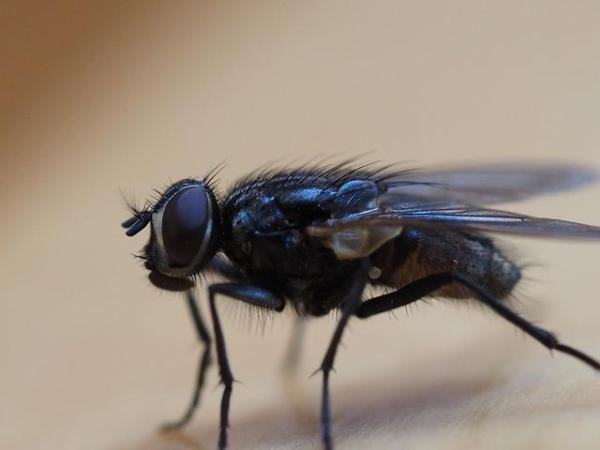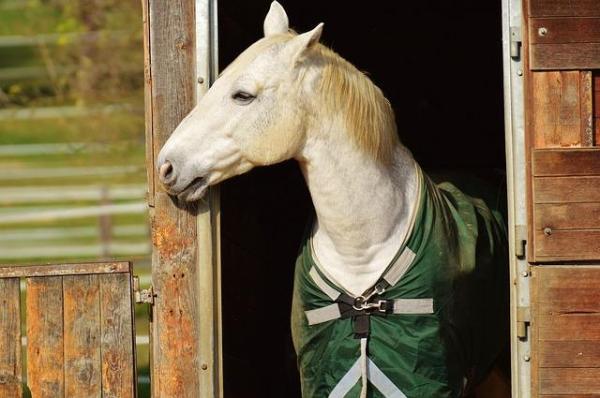Natural Remedies for Flies on Horses



See files for Horses
Controlling horse flies is a never-ending battle year after year, beginning with the rise in temperatures. Flies have directly obvious effects on horses: they can transmit diseases, cause allergic dermatitis, irritate mucous membranes and delay wound healing. In the eyes, they can cause irritation so severe that they even become conjunctivitis. Some horse owners prefer to use natural remedies instead of more aggressive insecticides.
The following AnimalWised article explains how you can keep flies away from horses using natural remedies.
The importance of controlling flies
In horse stables, fly proliferation is particularly problematic during the hottest months of the year. Some species of flies do not bite, but since they feed on bodily secretions, they are just as troublesome. These flies not only interfere with the normal wound healing process, but are often capable of irritating sensitive areas of the body such as the horse's nostrils, breasts, or genitals. They can also cause infections in the horses' eyes, which can lead to loss of vision if left untreated.
On the other hand, biting flies bring an additional problem. The horse tries to get rid of the itch of their bites by uncontrolled rubbing or scratching. As a result, injuries, wounds and scratches frequently occur with the risk of infection.
Last but not least, flies can also transmit diseases and even myiasis if they manage to lay their eggs in the horse's body. Not to mention that some horses are prone to allergic reactions to fly bites.
Usually focus on getting rid of the adult flies, as they are the most troublesome for horses. However, it is much more effective to get rid of the flies in their early life stages, such as pupae, larvae, and eggs.
A fly infestation is frustrating for both you and your horse. Fortunately, you have a number of options to combat flies on all fronts. Below we present a number of natural fly repellents that will either deter, repel or reduce flies.

Add external fly protection equipment
One of the simplest and most effective ways to keep flies from coming near the horse naturally is to provide a physical barrier. Additional outside protection is a good way to ward off pests and protect your horse from flies. You can either make such a garment yourself or buy equipment that will protect your horse from head to hoof.
Depending on the situation, you can choose from several options:
- Fly masks or fly caps: is a mask that covers the eyes, jaw and sometimes the ears and muzzle of horses to protect them from flies. The mask is semi-transparent and is made of a net so that the horse can see and hear while wearing it.
- Fly sheets or fly rugs: fly sheets are an excellent and inexpensive way to control bugs. They are placed over the animal's body and cover the back, torso, neck, and chest. The tail remains free, which helps the horse to scare away the flies. Like winter blankets, flysheets can be used year-round, but should be removed and adjusted periodically.
- Earmuffs: As the name suggests, they cover only the ears of the horse, which are one of the most sensitive parts of the horse.
These physical barriers only prevent adult flies from landing on the horse, but are not effective against the eggs, larval or pupal stages of the fly. Therefore, if you have a heavy fly population, you will probably need to combine this method with others for it to be effective.

Natural fly sprays for horses
A good fly spray should always be handy in the barn, when traveling, and on sultry summer days when flies are out of control. These products repel insects and can be sprayed or dabbed on, especially around the horse's eyes. Although there are hundreds of different commercially made fly sprays available to horse owners, the biggest drawback to these sprays are the chemicals they contain. These are not necessarily bad, but if you use fly spray all day long throughout the summer, your horse will be covered in chemicals for months, which can cause irritation.
Recipe for homemade fly spray for horses
The good thing about homemade fly sprays for horses is that they can be as simple or as complicated as you like. The simplest and easiest recipe for homemade fly spray consists of only 3 ingredients:
- Water (1 cup)
- Apple cider vinegar (2 cups)
- A few teaspoons of dishwashing liquid (a squirt)
All you need to do is mix these three ingredients in a spray bottle for about a minute. The dishwasher helps the water-vinegar mixture stay on the horse's coat surface longer. You can also create your own recipe by adding other essential oils such as lemongrass, peppermint or lavender oil. Some people also add sunscreen to the mixture for added protection from the sun.
The main problem with natural repellents is that they have to be applied very often, practically every day, because they have no residual effect. Therefore, they do not stay on the horse long enough to protect it from reinfestation.
The fact that we use natural remedies does not mean that they cannot also be toxic or cause adverse reactions. Therefore, before spraying your horse, test a small area to see if your horse is sensitive or irritated to the product. In general, it is always better to consult your veterinarian before applying any new product to your horse's skin.
If you want to learn more about the different parasites that can affect horses, you should read the following article about the different types of horse parasites.

Biological fly control
Parasitic wasps are a complementary strategy that can drastically reduce adult fly numbers. They can be purchased at an insect store.
The wasps are small and are biteless and stingless, so your horses will be safe around them. They lay eggs in the pupae of the flies, so you must place them at the breeding sites of the flies. Once these eggs hatch, they feed on the fly larvae and hatch as adults after about two weeks.
Parasitic wasps take about three weeks to form a generation, while flies take less than 10 days. Therefore, releasing wasps several times during the fly season is more successful than releasing a large population once.
Keep your horse's area clean
It may mean a little extra work for you, but a clean stall, paddock, or barn will help reduce flies and can go a long way toward making your horse feel comfortable. Housing a horse during the day can help protect it from flies. But there are also measures you can take to reduce the presence of flies in the barn and surrounding area, such as the following:
- Maintain hygiene by cleaning and collecting waste and utensils.
- Eliminate wet spots and standing water. Any source of stagnant or stinky water will attract flies.
- Do not pile manure. Remove it frequently to avoid attracting flies. Once you have removed the manure or organic material, spread it rather than piling it into a heap. This will break it up, dry it out, and make it far less attractive to pests.
- Keep stall walls washed down and floors disinfected.
- Clean and disinfect manure pails, tools, wash racks and grooming areas regularly.
- Spray the most problematic areas with a natural spray such as the one mentioned above.
Start implementing preventative measures at the beginning of the season. Do not wait until the fly population is out of control.
If you love horses and want to learn more about them, read the following article to learn how horses communicate and understand their body language.

This article is purely informative. AnimalWised does not have the authority to prescribe any veterinary treatment or create a diagnosis. We invite you to take your pet to the veterinarian if they are suffering from any condition or pain.
If you want to read similar articles to Natural Remedies for Flies on Horses, we recommend you visit our Parasitic diseases category.
- Junquera, P. (2021): Natural, vegetable or mineral parasiticidal chemical compounds . Parasitipedia.net









